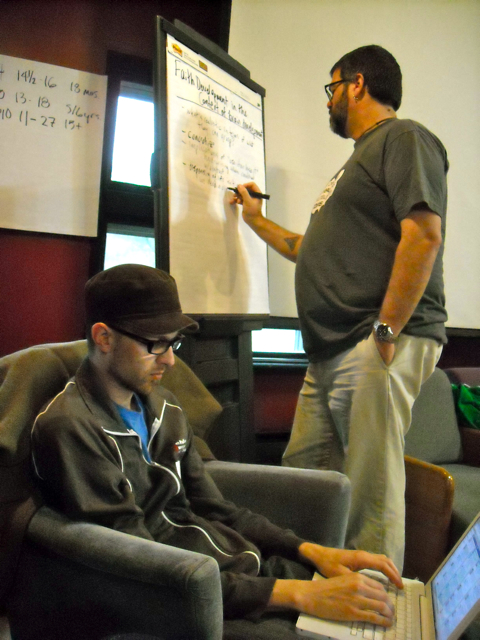 the 100 year old lodge at Skyview Ranch was filled with another full day of conversations at seismos 2010. again more that two dozen youth pastors and workers walked through a good day. although i don’t think it was directly said…the theme that seem to develop was “journey not destination”. Personally i think that’s true for both youth and those of us that serve them. Building on the insights from our spring boarding text Primal Teen that those of us walking with adolescents and their families really are guides to helping both see their place in the larger Story. The three sessions before the evening meal focused on:
the 100 year old lodge at Skyview Ranch was filled with another full day of conversations at seismos 2010. again more that two dozen youth pastors and workers walked through a good day. although i don’t think it was directly said…the theme that seem to develop was “journey not destination”. Personally i think that’s true for both youth and those of us that serve them. Building on the insights from our spring boarding text Primal Teen that those of us walking with adolescents and their families really are guides to helping both see their place in the larger Story. The three sessions before the evening meal focused on:
- Faith Development
- Being Failure Friendly
- Accommodating or Challenging
here’s some notes from each session. there is a lot here…
Faith Development in the Context of Brain Development
- what’s realistic in terms of what they can grasp?
- concretize
- implications of “use it or lose it”
- hard-wiring when combined with abstract
- dispensing of info isn’t as effective we need a dialogical approach
- what can we build into our programs that will move them along this process.
- Story is a critical tool
- The “rebellious disciple” (good)
- correlation of worldview shifts & brain stuff
- authenticity (verbalization ) of successes is just as important as failures
- so much of this depends on volunteers who connect w/ kids’ hearts
- character
Crafting a Failure-Friendly Church
- failure: “not living up to someone’s expectations” (mine, yours, God’s)
- (requires an awareness of expectations)
- need a “feelings safe” environment
- help reframe lousy expectations & frame expectations they may not be aware of
- when working w/ Parents (& church leaders) who are creating expectations, get at their positive intent
- failure-friendly & identifying & honoring strengths are symbiotic
- when we treat kids as consumers there’s no space for choice or responsibility & no failure or success.
- we have to model this with our leaders
- use biblical examples
- check our self-worth – do we need kids to succeed in order to succeed ourselves
- belonging implies grace, implies “free to sin”
Accommodation vs. Challenging
- Yes= calling to maturity, maybe not=shortening adolescence
- careful that “shortening adolescence doesn’t imply that adolescence is bad.
- consider our language (“kids” for young adults)
- call them to Kingdom living now vs. a “preparatory mindset”
- shift in what a “training a child up” means
- encouragement instead of expectation
- encourage growth and maturity & a vision of who they can be, while holding grace & space for them to be teenagers.
- responsibility grows people.
